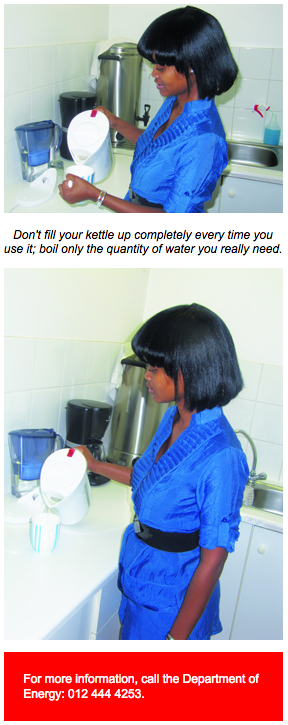Save it!
To raise awareness and get all South Africans on board to help save energy, government has launched the Save It! campaign. The campaign aims to promote a culture of energy efficiency in South Africa. With rising energy costs and the threat of global warming, we have to learn to use existing supplies of power more wisely to avoid a crisis.
 If every South African makes an effort to use less energy, we will be able to reduce the general energy demand. This means there will be more to go around and there won't be a need for power cuts. In order to achieve this, all South Africans must use energy responsibly in factories, schools, universities, offices, hospitals, hotels and at home.
If every South African makes an effort to use less energy, we will be able to reduce the general energy demand. This means there will be more to go around and there won't be a need for power cuts. In order to achieve this, all South Africans must use energy responsibly in factories, schools, universities, offices, hospitals, hotels and at home.
What is energy?
We need energy for many of our daily activities – for cooking, heating, lighting, entertainment and working.
The energy we need to perform our daily tasks generally comes from the sun and the food we eat. But there is another very important type of energy that we simply cannot do without. This energy is used to run our households, offices and factories. We need it for hot water, to cook food and operate lights, irons, washing machines, heaters, televisions, computers, power tools, industrial equipment and many more.
This kind of energy is mostly supplied to us in the form of electricity, but as the cost of power goes up and supplies decrease, we need to know all there is about energy efficiency.
Why is there a shortage of energy?
For many years, people have used fossil fuels like oil and coal for power. However these resources are finite. This means that one day they will run out. Due to the population growing and development taking place, the demand for power has increased.
Why is renewable energy important?
Renewable energy comes from natural sources that are readily available and can easily replace themselves, like the sun, wind, plant matter and geothermal heat.
There are other sources of energy such as gas and nuclear power, but they are not as kind to the environment as renewable energy.
What does it mean to be energy-efficient?
Being energy efficient means not wasting energy, using less of it to perform the same activities as before and switching over to other, cleaner sources that are kinder to the earth. Basically, it means using energy smarter.
Why is it important to save energy?
Most energy in South Africa comes from electricity, which comes from coal-fired power stations. They produce carbon emissions that are harmful to the environment. Because of the economic development that has taken place in our country, electricity demand has shot up. This means that more electricity has to be produced, which will increase carbon emissions.
But there is another way of solving this, simply use less electricity and be more energy efficient. Not only will this save our planet for future generations, it will also ensure that there is enough energy for all. So, let's all stand together and SAVE IT
Tips to save energy
Lighting
- Switch off all lights that you are not using or every time you leave a room.
- Replace your old light bulbs with CFLs (compact fluorescent lamps) or LED (light-emitting diode) lighting. They provide energy savings of up to 80 per cent and cut maintenance costs because they last six to eight times longer.
- Use low-wattage light bulbs in rooms where you don't need strong lighting.
In the kitchen
- When you cook food in the oven, do not open the door from time to time, as heat will escape and more energy will be needed to make up for it.
- Do not fill your kettle up completely every time you use it, only boil the quantity of water you really need.
- If you have a pressure cooker, use it to prepare stews, pot roasts and puddings.
- Let hot food cool off properly before you put it in the fridge or freezer, as extra power is needed to chill something that is warm.
- Empty your fridge and switch it off when you go away for a long period of time.
Other
- Some general appliances use electricity on the standby mode even when they're turned off. These are the devices that you switch off with a remote control. Although on standby mode, they use up to 50 per cent of the power they use when fully operational. This includes TVs, DVDs, home entertainment systems and computers. Be sure to switch off all these appliances at the wall.
- Geysers and space heaters generally use the most energy in a household. Geysers account for around 39 per cent of power usage, while heaters and air-conditioners use about 16 per cent. Turn your geyser down to 60˚C – this is still hot
enough for general household use. - As far as possible, shower instead of bath, as it uses far less water and electricity.
- When washing your hands or fruit and vegetables, use cold water.
- Don't let water run from the taps unnecessarily. Get into the habit of saving water and using a plug when doing washing in the basin.
- Fix leaking hot water taps, as they can easily waste up to 18 litres of water per day .
- In winter, rather dress warmly before you switch on the space heater.
- Do not switch heaters on in every room, only warm up the rooms you are using.



 Facebook
Facebook Twitter
Twitter WhatsApp
WhatsApp